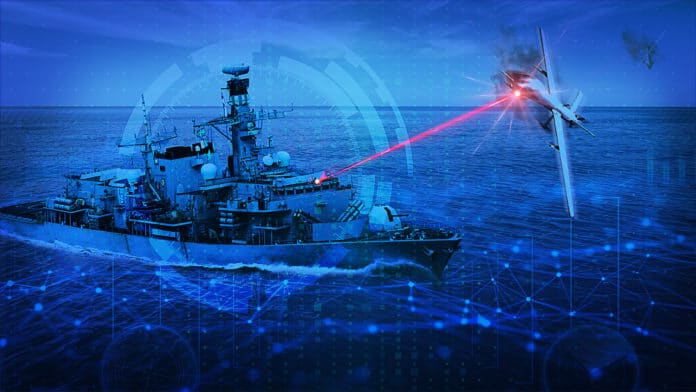The British Ministry of Defence (MOD) has awarded three contracts worth around £72.5-million to the UK industry to produce Directed Energy Weapons (DEW) as part of the Novel Weapons Programme (NWP).
As a part of three four-year contracts, the UK industry consortia headed by Thales and Raytheon UK will develop advanced laser and radio frequency demonstrators to be mounted on Royal Navy ships and British Army vehicles. The objective is to produce a trio of weapons that can be installed on ships, armored vehicles, and trucks without the need for heavy modifications to the vehicle. These next-generation technologies could revolutionize the battlefield and reduce the risk of collateral damage.
Directed Energy Weapons are powered by electricity and operate without ammunition, significantly reducing operating costs, increasing platform endurance, and providing unprecedented offensive and defensive flexibility to personnel on the frontline.
The first laser demonstrator (LDEW) will undergo user testing onboard a Royal Navy Type 23 frigate by detecting, tracking, engaging, and countering Unmanned Aerial Vehicles (UAV). Meanwhile, a second laser demonstrator will be fitted on the British Army’s Wolfhound armored vehicle to investigate capability against UAV and other air threats. The radio frequency demonstrator will also be used by the British Army, hosted on a MAN SV truck to detect and track a variety of air, land, and sea targets.
These innovative capabilities will undergo user experimentation from 2023 to 2025 that will focus on the operation and maintenance of these new systems and will provide invaluable knowledge, information, and experience to assess whether DEW can be fully embedded on other Defence assets in the future. These tests will be carried out by the newly formed Team Hersa that brings together the best acquisition skills from Defence Equipment and Support (DE&S) and the best in technical expertise from the Defence Science and Technology Laboratory (Dstl).
“These technologies have the potential to revolutionize the future battlefield for our Armed Forces, enabling the prosecution of new targets in the land, sea, and air domains and allowing commanders to meet mission objectives in new ways,” said Shimon Fhima, MOD Director Strategic Programmes. “We must exploit at pace the cutting-edge technologies developed by the talented scientists and engineers across the UK to capitalize on its benefit.”
